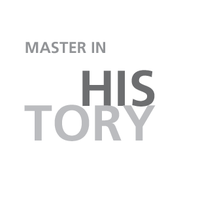Lines of Research
Field of Concentration: History, Societies and Cultures in Global South
The master's program in the Graduate Program in History at UNILA is currently divided into two research lines, aimed at accommodating projects, seminars, and courses that represent distinct areas of focus. These research lines foster greater collaboration and interaction between students and faculty. Each research line forms a core of research activities within the program, involving common research themes, methodologies, and theoretical reflections. Thus, shortly after enrolling in the master's program, students are assigned to one of the research lines and are advised by faculty members who are also associated with that line.
1) Social Movements, Cultural Flows and Identities
The research line "Social Movements, Cultural Flows, and Identities" brings together studies on social and cultural formations, focusing on the symbolic exchanges and historical processes involved in the configuration of identities and their political and social consequences in Latin America, Africa, and Asia during the modern period, particularly in the processes of globalization starting in the early modern period of the 16th century, and in the contemporary era, especially in the 19th and 20th centuries. In dialogue with the fields of Social History and Cultural History, and within the theoretical frameworks of transnational histories, this research line encompasses studies on representations and imaginaries, territorialities, sociabilities, agencies, and resistances of different social groups and historical formations of ethno-cultural, class, and gender identities. It includes the study and critical examination of social and political mobilizations organized around these multiple identities, their historical actions, and contemporary perspectives, related to issues and themes of strong transnational significance, such as human rights, migrations, diasporas, and contemporary debates on historical reparations. Therefore, the focus is on studying the historical processes of forming ethnic, regional, national, linguistic, religious, class-based, political, and social identities, including their expression in various cultural practices (such as drug use and food, music, literature, and the press), spatial practices, bodily practices, and aspects of everyday life, such as family life and social relations.
Professors:
Alexandre Camera Varella
Clovis Antonio Brighenti
Endrica Geraldo
Evander Ruthieri S. da Silva
Mirian Santos Ribeiro de Oliveira
Rodrigo Faustinoni Bonciani
Tiago Bonato
2) Modernities, Institutions and Languages
The research line "Modernities, Institutions, and Languages" focuses on the study of Latin American modernities as experienced by various groups and social actors, in their political, social, and cultural dimensions, prioritizing the period from the 19th century to the present. This research line critically examines the dynamics of Latin American modernity by proposing new units and articulations for its objects of study through transnational configurations and by connecting Latin American and Caribbean history to global processes, challenging the units constructed around the essentialization of national borders. The line is particularly interested in the expressions of modernity within various institutions, regional and local relations, with an emphasis on research involving different forms of language (art, heritage, photography, audiovisual media, literature, press, and historiography). Additionally, this line is concerned with the critical study and contestation of Latin American modernities in the development of historical consciousness among individuals in both formal and informal educational contexts. Drawing from multiple objects of study, this line offers a perspective on the dialogues, conflicts, and negotiations between the cultures that make up Latin America. The study of the concepts through which the historical experience of modernity in the continent has been articulated, including ideas and forms of thought, symbolic representations, and the visual and narrative codes confronted in Latin American multiculturalism, will be central themes in this research line.
Professors:
Hernan Venegas Marcelo
Paulo Renato da Silva
Rosangela de Jesus Silva
Pedro Afonso Cristovão dos Santos
Tereza Spyer Dulci
